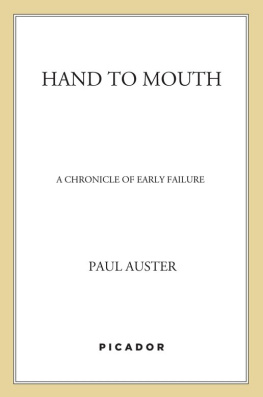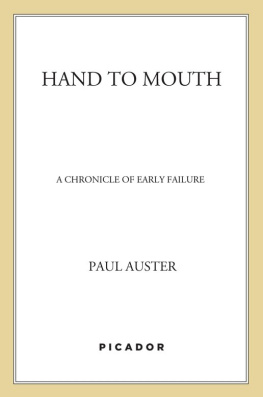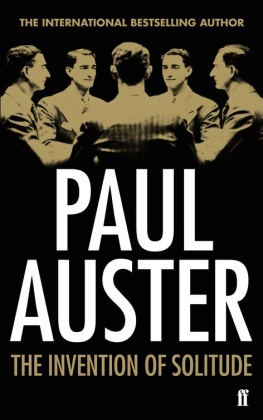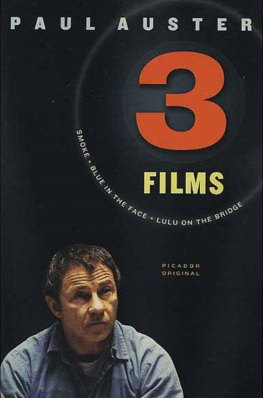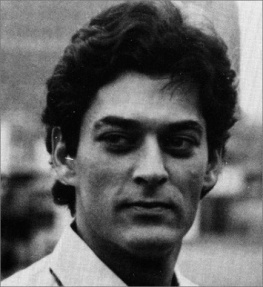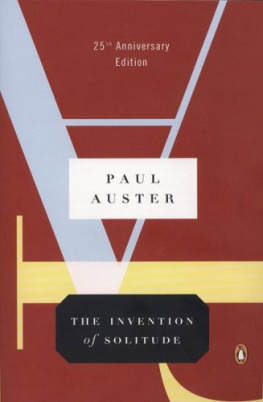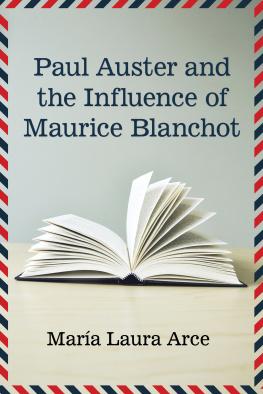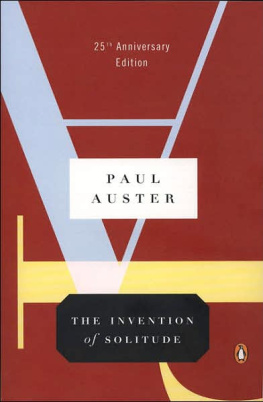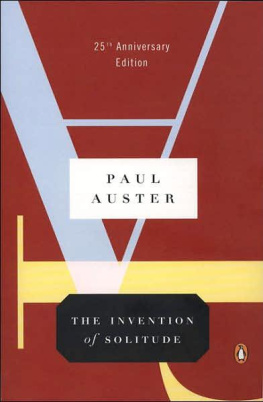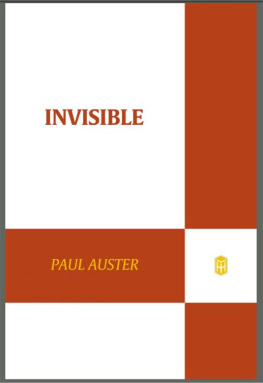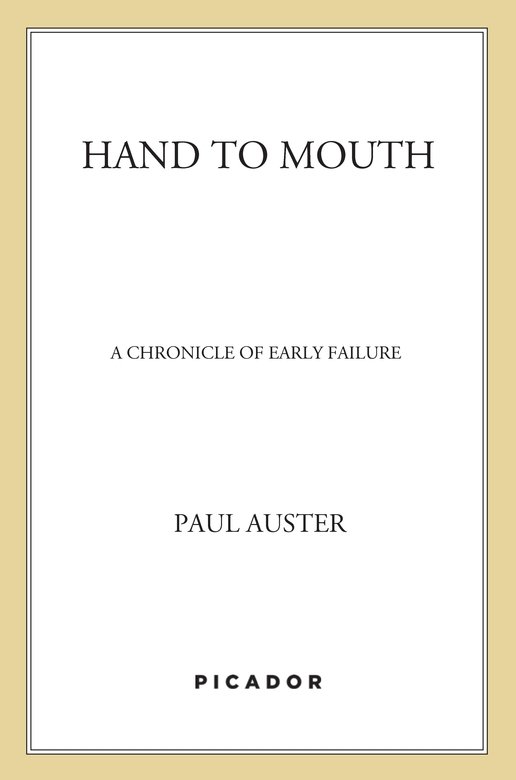Novels
The New York Trilogy (City of Glass Ghosts
The Locked Room) In the Country of Last Things
Moon Palace The Music of Chance Leviathan
Mr. Vertigo Timbuktu The Book of Illusions
Nonfiction
White Spaces The Invention of Solitude The Art of
Hunger Why Write? The Story of Mr. Typewriter (with
Sam Messer) The Red Notebook
Screenplays
Smoke & Blue in the Face Lulu on the Bridge
Poetry
Unearth Wall Writing Fragments from Cold Facing the Music Disappearances: Selected Poems
Editor
The Random House Book of Twentieth-Century French
Poetry I Thought My Father Was God: And Other True
Tales from NPRs National Story Project
IN MY LATE twenties and early thirties, I went through a period of several years when everything I touched turned to failure. My marriage ended in divorce, my work as a writer foundered, and I was overwhelmed by money problems. Im not just talking about an occasional shortfall or some periodic belt tighteningsbut a constant, grinding, almost suffocating lack of money that poisoned my soul and kept me in a state of never-ending panic.
There was no one to blame but myself. My relationship to money had always been flawed, enigmatic, full of contradictory impulses, and now I was paying the price for refusing to take a clear-cut stand on the matter. All along, my only ambition had been to write.I had known that as early as sixteen or seventeen years old, and I had never deluded myself into thinking I could make a living at it. Becoming a writer is not a career decision like becoming a doctor or a policeman. You dont choose it so much as get chosen, and once you accept the fact that youre not fit for anything else, you have to be prepared to walk a long, hard road for the rest of your days. Unless you turn out to be a favorite of the gods (and woe to the man who banks on that), your work will never bring in enough to support you, and if you mean to have a roof over your head and not starve to death, you must resign yourself to doing other work to pay the bills. I understood all that, I was prepared for it, I had no complaints. In that respect, I was immensely lucky. I didnt particularly want anything in the way of material goods, and the prospect of being poor didnt frighten me. All I wanted was a chance to do the work I felt I had it in me to do.
Most writers lead double lives. They earn good money at legitimate professions and carve out time for their writing as best they can: early in the morning, late at night, weekends, vacations. William Carlos Williams and Louis-Ferdinand Cline were doctors. Wallace Stevens worked for an insurance company. T. S. Eliot was a banker, then a publisher. Among my own acquaintances, the French poet Jacques Dupin isco-director of an art gallery in Paris. William Bronk, the American poet, managed his familys coal and lumber business in upstate New York for over forty years. Don DeLillo, Peter Carey, Salman Rushdie, and Elmore Leonard all worked for long stretches in advertising. Other writers teach. That is probably the most common solution today, and with every major university and Podunk college offering so-called creative writing courses, novelists and poets are continually scratching and scrambling to land themselves a spot. Who can blame them? The salaries might not be big, but the work is steady and the hours are good.
My problem was that I had no interest in leading a double life. Its not that I wasnt willing to work, but the idea of punching a clock at some nine-to-five job left me cold, utterly devoid of enthusiasm. I was in my early twenties, and I felt too young to settle down, too full of other plans to waste my time earning more money than I either wanted or needed. As far as finances went, I just wanted to get by. Life was cheap in those days, and with no responsibility for anyone but myself, I figured I could scrape along on an annual income of roughly three thousand dollars.
I tried graduate school for a year, but that was only because Columbia offered me a tuition-free fellowship with a two-thousand-dollar stipendwhich meant that I was actually paid to study. Even underthose ideal conditions, I quickly understood that I wanted no part of it. I had had enough of school, and the prospect of spending another five or six years as a student struck me as a fate worse than death. I didnt want to talk about books anymore. I wanted to write them. Just on principle, it felt wrong to me for a writer to hide out in a university, to surround himself with too many like-minded people, to get too comfortable. The risk was complacency, and once that happens to a writer, hes as good as lost.
Im not going to defend the choices I made. If they werent practical, the truth was that I didnt want to be practical. What I wanted were new experiences. I wanted to go out into the world and test myself, to move from this to that, to explore as much as I could. As long as I kept my eyes open, I figured that whatever happened to me would be useful, would teach me things I had never known before. If this sounds like a rather old-fashioned approach, perhaps it was. Young writer bids farewell to family and friends and sets out for points unknown to discover what hes made of. For better or worse, I doubt that any other approach would have suited me. I had energy, a head crammed full of ideas, and itchy feet. Given how big the world was, the last thing I wanted was to play it safe.
I ts not difficult for me to describe these things and to remember how I felt about them. The trouble begins only when I question why I did them and why I felt what I felt. All the other young poets and writers in my class were making sensible decisions about their futures. We werent rich kids who could depend on handouts from our parents, and once we left college, we would be out on our own for good. We were all facing the same situation, we all knew the score, and yet they acted in one way and I acted in another. Thats what Im still at a loss to explain. Why did my friends act so prudently, and why was I so reckless?
I came from a middle-class family. My childhood was comfortable, and I never suffered from any of the wants and deprivations that plague most of the human beings who live on this earth. I never went hungry, I never was cold, I never felt in danger of losing any of the things I had. Security was a given, and yet for all the ease and good fortune in the household, money was a subject of continual conversation and worry. Both of my parents had lived through the Depression, and neither one had fully recovered from those hard times. Each had been marked by the experience of not having enough, and each bore the wound in a different way.
My father was tight; my mother was extravagant. She spent; he didnt. The memory of poverty had notloosened its hold on his spirit, and even though his circumstances had changed, he could never quite bring himself to believe it. She, on the other hand, took great pleasure in those altered circumstances. She enjoyed the rituals of consumerism, and like so many Americans before her and since, she cultivated shopping as a means of self-expression, at times raising it to the level of an art form. To enter a store was to engage in an alchemical process that imbued the cash register with magical, transformative properties. Inexpressible desires, intangible needs, and unarticulated longings all passed through the money box and came out as real things, palpable objects you could hold in your hand. My mother never tired of reenacting this miracle, and the bills that resulted became a bone of contention between her and my father. She felt that we could afford them; he didnt. Two styles, two worldviews, two moral philosophies were in eternal conflict with each other, and in the end it broke their marriage apart. Money was the fault line, and it became the single, overpowering source of dispute between them. The tragedy was that they were both good peopleattentive, honest, hardworkingand aside from that one ferocious battleground, they seemed to get along rather well. For the life of me I could never understand how such a relatively unimportant issue could cause so much trouble between them. Butmoney, of course, is never just money. Its always something else, and its always something more, and it always has the last word.

